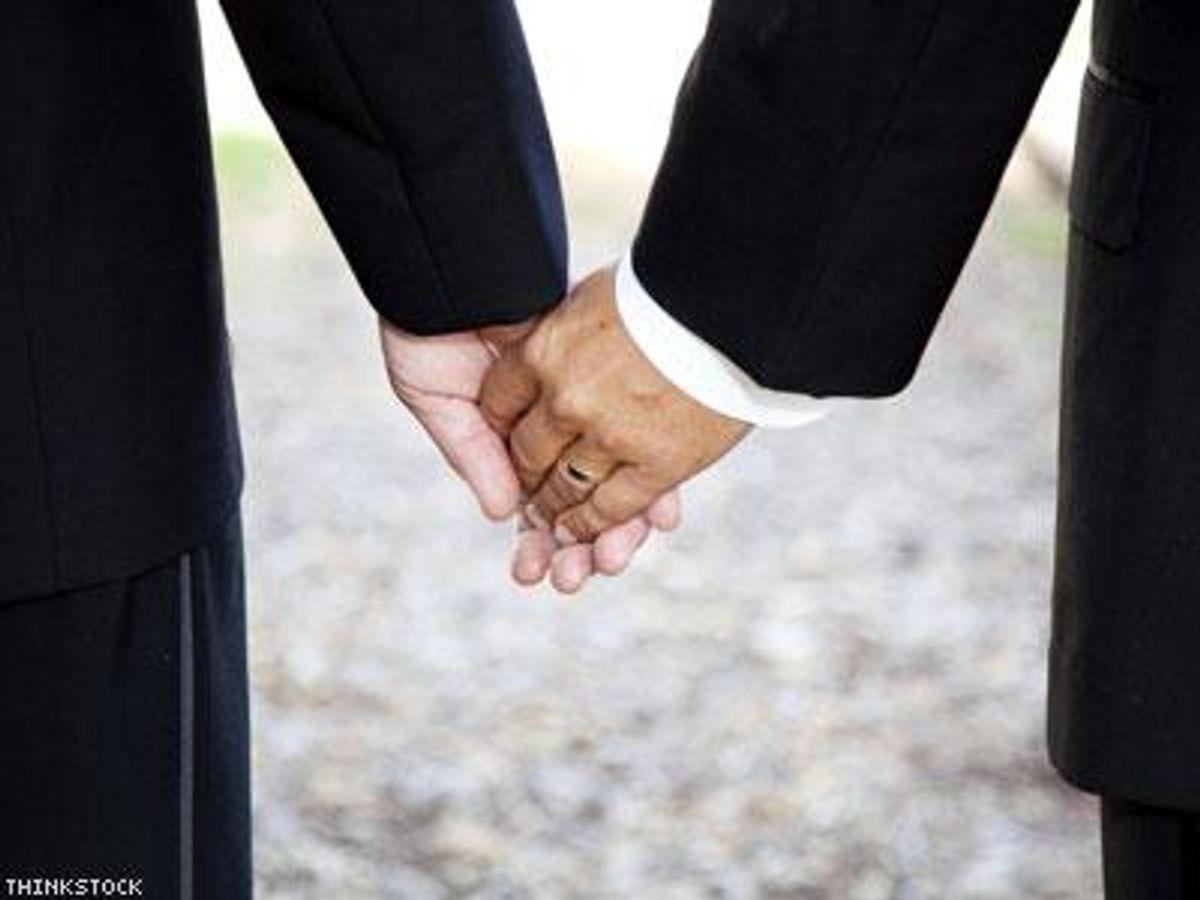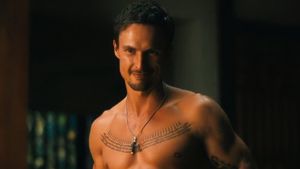A new survey conducted by The Knot in partnership with The Advocate finds that one year after the U.S. Supreme Court's landmark ruling and marriage equality's spread across the country, same-sex couples are starting new traditions.
Released Thursday, the report draws information from thousands of Advocate.com readers about trends being adopted in their engagements and nuptials. The Knot also polled straight couples for information about their own practices, demonstrating similarities but also notable varations between the two demographics.
With a wave of new U.S. states with marriage equality in the past year, most same-sex couples (82 percent, up from 70 percent in 2013) are making it very clear to attendees that their ceremony is a wedding, by calling it this term in invitations. A minority of same-sex couples label their event a celebration (7 percent), a commitment ceremony (4 percent), or a civil union (2 percent).
Among engaged same-sex couples, 58 percent indicated there was a formal proposal (and for 38 percent of this pool, it was a surprise occasion), compared to straight couples, who had a much higher proposal rate of 94 percent. A sizable portion of same-sex couples (38 percent) mutually decided to wed. Methods of popping the question ranged from traditional venues -- "Date. Dinner. Ring" read one response -- to the more adventurous, with settings including mountain peaks, safaris, the Great Wall of China, a hot air balloon, and a "pirate-themed" soiree.
Breaking from tradition, 77 percent of respondents in same-sex couples did not ask the family's permission before getting engaged. The survey didn't ask why that step was skipped, though same-sex couples could have fraught relationships with disapproving family. Conversely, 71 percent of straight fiances did ask the family's permission. And 26 percent of same-sex couples said that, of all the possible surprises that were involved with wedding planning, they were most pleased to learn that their families were accepting and willing to help them throughout the process.
Of same-sex couples, 26 percent noted they would be forgoing the custom of engagement rings, which is in stark constrast to the 65 percent of straight couples who said they used an engagement ring. Among same-sex couples who did exchange engagement rings, 29 percent chose a plain band over one studded with a diamond or other gems. Moreover, the majority of gay and lesbian respondents who did purchase a ring (54 percent) did not spend more than $1,000 on the purchase.
The 2014 survey reports the average length of living together before marriage among same-sex couples is 6.5 years, although the length is spread fairly evenly in terms of time, with 13 percent of respondents waiting 1-2 years, 11 percent waiting 7-10 years, and 6 percent waiting 25 years or longer. This is likely due to the fact that many states have gained marriage equality in the past year, giving long-term couples the opportunity to finally tie the knot.
In planning their matrimonies, same-sex couples are spending less on average ($15,849) than straight couples ($29,858). However, same-sex couples tend to invite fewer guests, meaning the amount spent per person is only slightly less ($205) than in a straight couple's wedding ($220). Also, more straight couples (96 percent) will have both a ceremony and reception, compared to 76 percent of same-sex couples, who have a greater chance of hosting only a ceremony (12 percent) or only a reception (7 percent). Moreover, only 13 percent of straight couples are paying for their weddings out of their own pockets, compared to 85 percent of same-sex couples.
Some 81 percent of same-sex couples indicated that they would not hire a wedding planner. So they're being very hands-on when deciding how to adopt traditions.
The tradition of "walking down the aisle" divided same-sex couple respondents. At 45 percent, fewer than half said that either one or both partners would continue this tradition, and among these gay and lesbian walkers, 59 percent of female sex-couples and 37 percent of male same-sex couples would be escorted by a family member. At 94 percent, straight couples overwhelmingly report keeping this practive alive. But even among same-sex couples that do plan to walk, there are creative differences, including one walk that incorporated pet dogs along the partners' sides.
Same-sex couples are far less likely than straight couples to have a religious service or officiant. Only 38 percent of those who responded to the survey said they would include a religious element to their wedding, favoring either a justice of the peace (23 percent) or a family member or friend (21 percent) to conduct the proceedings. By contrast, 63 percent of straight couples favored a religious service. In this vein, more same-sex couples (49 percent) are writing their own vows, although 29 percent said they did or would incorporate a religious component to the speech.
The practice of having one partner change a last name after marriage is not being adopted by most same-sex couples. Only 23 percent of gay couples and 41 percent of lesbian couples are going with this practice, with 54 percent keeping their own names and 15 percent creating a hyphenated surname. In contrast, 79 percent of straight brides-to-be marked "I'm changing my name to his."
From those same-sex couples who took the survey, the most popular marriage locations in descending order by state are California (19 percent), New York (13 percent), Illinois (7 percent), Washington (5 percent), Massachusetts (5 percent), Iowa (3 percent), Hawaii (3 percent), and Washington, D.C. (3 percent).
Overall, the majority of same-sex couples (56 percent) indicated that, rather than a traditional wedding (20.94 percent), theirs was "casual and unique - very go with the flow, no rules and fun."
"Here at The Knot, we've been proud supporters of marriage equality from day one," said Rebecca Dolgin, The Knot's editor in chief. "In researching for Gay Weddings From The Knot, a special digital magazine we just released to celebrate equal love for all, we wanted to look further into the traditions the LGBT community is following and making their own."
Explore the special Gay Weddings From The Knot issue in full.


















































































